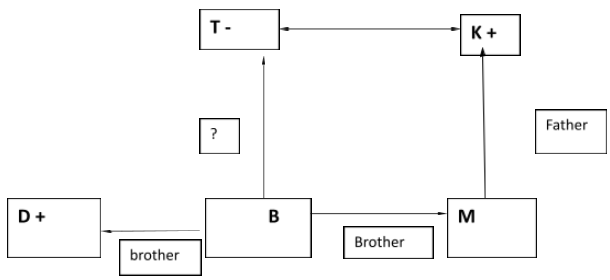The family tree is one of the most important topics in the reasoning section of any competitive examination. Aspirants should acquire great knowledge about blood relations to proficiently and accurately solve these questions within the given time. Consistent practice, time management, and knowledge about family relations can help one score well in these tests. This article lists simple methods to solve family tree problem-related questions.
What are the family tree problem-related questions?
The family tree problem-related questions are verbal reasoning questions where the candidate has to find out relations among the family members. The relationships are either made by using a chain or a family tree.
The Blood Relation Chart
Unless you know the relationships in a family, you cannot solve the blood relation questions. The following table will help you understand and remember the relations in a family easily.
Blood Relations | Term used |
Father of Grandmother/Grandfather | Great Grandfather |
Mother of Grandmother/Grandfather | Great Grandmother |
Father of Father | Paternal Grandfather |
Mother of Father | Paternal Grandmother |
Father of mother | Maternal Grandfather |
Mother of mother | Maternal Grandmother |
Siblings | Brother or sister of same parents |
Son of brother/sister | Nephew |
Daughter of sister/brother | Niece |
Sister of wife/husband | Sister-in-law |
Brother of husband/wife | Brother-in-law |
Cousin | Children of uncle/aunt |
Spouse | Husband/wife |
Father-in-law | Father of spouse |
Mother-in-law | Mother of spouse |
Why are family tree questions tough to answer?
Aspirants can score on the blood relations problems only if they have clear and profound knowledge about the family tree and family relations. Otherwise, they may appear time-consuming and convoluted.
Nowadays, most families are nuclear. It has become difficult for most of us to know all family relations and understand how the branches of a family tree flow.
Additionally, the family tree problems are often mixed with other logical reasoning questions such as directions and seating arrangements. Thus, they are tricky for the candidates to answer. Still, there are simple methods to solve family tree problem-related questions.
How to solve family tree questions?
The family tree questions can be of different types, such as:
Based on codes
Based on puzzles
Based on statements
Example 1: Rahul said to Hari, “The boy playing with the ball is the younger one out of the two brothers of my father’s wife’s daughter. What is the relation between the boy playing with the ball and Rahul?
The method: Backtracking.
Rahul’s father’s wife = Rahul’s Mother 🡪 Daughter of Rahul’s mother = Rahul’s sister 🡪 Younger brother of Rahul’s sister = Rahul’s younger brother.
Answer: The boy playing with the ball is Rahul’s younger brother.
Example 2: D is B’s brother, M is B’s brother, K is M’s father, and T is K’s wife. Find the relation between T and B.
The method: Family tree has to be drawn.
Males are represented by ‘+’, and females are represented by ‘-‘. Vertical lines are used to represent the relationship between different generations. The symbol ‘=’ denotes a couple, and ‘-‘is used for siblings. When the relation is not known, ‘?’ is used.

M, B, and D are siblings
K is the father of M, B, and D
T is the mother of M, D, and B
Answer: T and B are mother and child.
Competitive examinations that include family tree-related questions
The list of competitive exams where family tree problem-related questions are important are:
IBPS PO (Institute of Banking Personnel Selection Probationary Officer)
IBPS (Institute of Banking Personnel Selection) Clerk
SBI (State Bank of India) Clerk
SBI PO (State Bank of India Probationary Officer)
RBI (Reserve Bank of India) Assistant
IBPS RRB (Institute of Banking Personnel Selection Regional Rural Banks) Officers
IBPS RRB SO (Institute of Banking Personnel Selection Regional Rural Banks Specialist Officers)
SSC CGL (Staff Selection Commission Combined Graduate Level) Examination
SSC CHSL (Staff Selection Commission Combined Higher Secondary Level) Examination
MAT (Management Aptitude Test)
CLAT (Common Law Admission Test)
GATE (Graduate Aptitude Test in Engineering)
CAT (Common Admission Test)
XAT (Xavier Aptitude Test)
CTET(Central Teacher Eligibility Test)
TET (Teacher Eligibility Test)
Railway recruitment exams
Conclusion
The family tree problems are not direct and are time-consuming. Learning the entire family tree relationship table is not enough to solve the questions within the stipulated time. The candidates must employ simple methods to solve family tree problem-related questions. They must practice as many problem questions as they can. Additionally, they must also have a clear understanding of other reasoning concepts, such as directions or seating arrangements.
 Profile
Profile Settings
Settings Refer your friends
Refer your friends Sign out
Sign out






